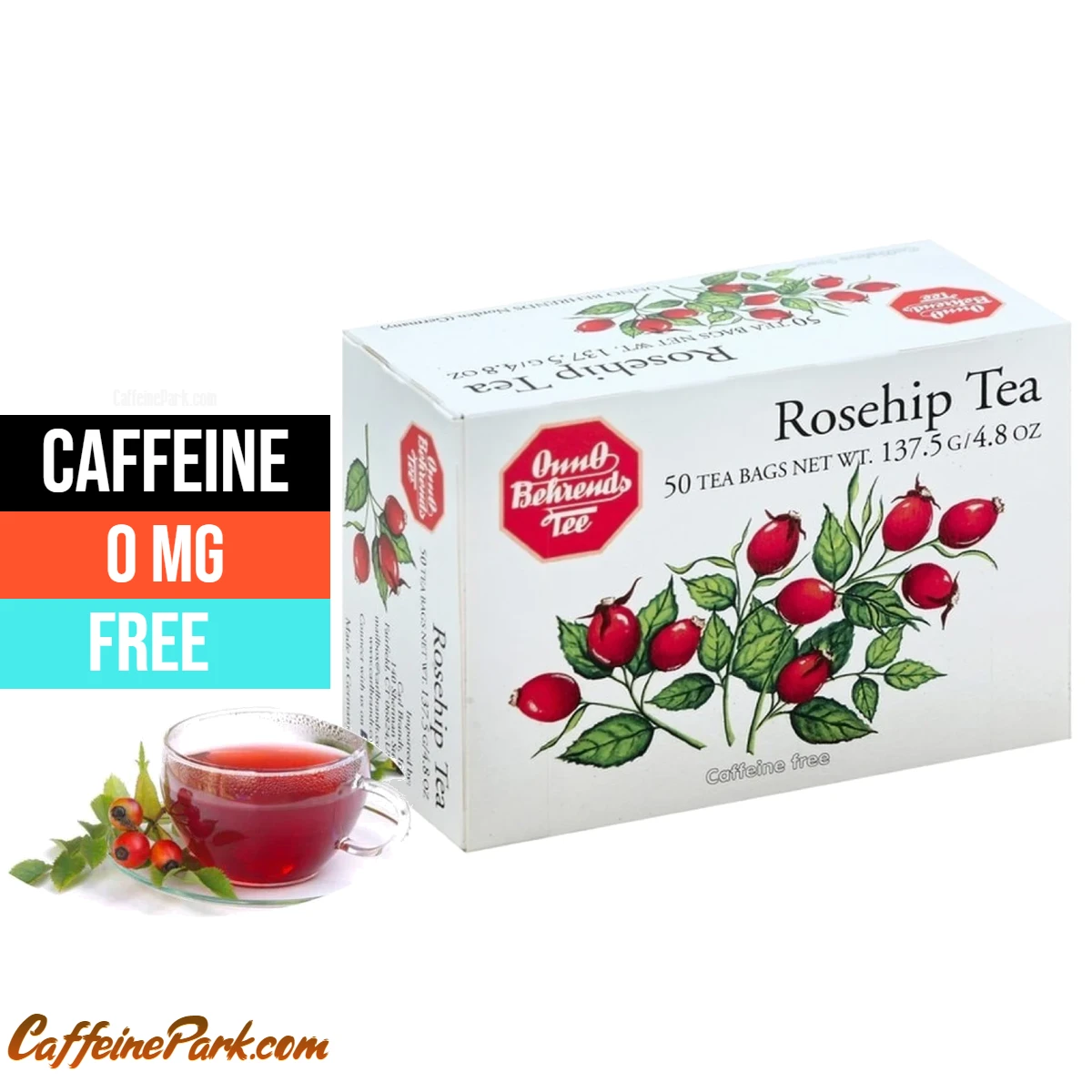Rosehip Tea Caffeine Content

Welcome to my blog about rosehip tea and its caffeine content! If you’re a tea lover looking for a delicious and healthy caffeine-free option, then you’ve come to the right place. Rosehip tea is a popular herbal tea made from the fruit of the rose plant, and it has many potential health benefits. In this blog, I’ll be exploring the caffeine content of rosehip tea and answering some common questions about this tasty beverage.
For those who are sensitive to caffeine, finding a satisfying and flavorful drink can be a challenge. But with rosehip tea, you don’t have to worry about any caffeine jitters or sleepless nights. Not only is it caffeine-free, but it also has a slightly tart and fruity flavor that is sure to please your taste buds. Plus, rosehip tea is a rich source of vitamin C, antioxidants, and other nutrients that can support your immune system and overall health.
So if you’re curious about the caffeine content of rosehip tea and want to learn more about its potential health benefits, be sure to read through my blog. Whether you’re a tea enthusiast or just looking for a new beverage to try, I think you’ll find that rosehip tea is a delicious and satisfying choice. So let’s dive in and explore everything there is to know about rosehip tea!
Rosehip tea is a caffeine-free herbal tea that is made by steeping dried rosehips in hot water. The tea has a tart, slightly sweet flavor that is often compared to cranberries or hibiscus.
Does Rosehip Tea Contain Caffeine?
No, Rosehip tea does not contain caffeine. As a Type of herbal tea, it is naturally caffeine-free. This makes it a great option for people who are sensitive to caffeine, or who simply want to avoid it.
However, it’s worth noting that not all herbal teas are caffeine-free. Some herbal teas, such as yerba mate and Guayusa, actually do contain caffeine. So, if you’re specifically looking for caffeine-free tea, be sure to check the label or ask the vendor.
Benefits of Rosehip Tea
Rosehip tea is a delicious and healthy beverage that is packed with potential health benefits. In this section of my blog, I’ll be exploring some of the many benefits of Rosehip tea and why you might want to consider adding it to your daily routine.
Rich in Vitamin C
Rosehip tea is an excellent source of vitamin C, which is important for immune function, skin health, and collagen production. In fact, one cup of Rosehip tea can provide up to 50% of your daily recommended intake of vitamin C. This makes it a great choice for anyone looking to support their immune system and keep their skin healthy and glowing.
Anti-Inflammatory Properties
Rosehip tea contains a variety of compounds that have anti-inflammatory properties, including polyphenols and galactolipids. These compounds may help reduce inflammation in the body, which can help improve symptoms of conditions like arthritis and asthma. In addition, Rosehip tea may also help protect against chronic diseases like heart disease and cancer, which are often associated with chronic inflammation.
May Lower Blood Pressure
Some studies have suggested that Rosehip tea may help lower blood pressure, which is an important factor in heart health. This is likely due to the high levels of antioxidants found in Rosehip tea, which can help improve blood vessel function and reduce oxidative stress. While more research is needed to confirm these benefits, adding Rosehip tea to your diet may be a simple and natural way to support your cardiovascular health.
Digestive Health
Rosehip tea is also believed to have digestive benefits, thanks to its high fiber content. Fiber is important for maintaining healthy bowel function and promoting the growth of beneficial gut bacteria. In addition, some studies have suggested that Rosehip tea may have a mild laxative effect, which can help prevent constipation and promote regularity.
Weight Loss
Finally, some research has suggested that Rosehip tea may be helpful for weight loss. This is because it is low in calories and high in fiber, which can help keep you feeling full and satisfied. In addition, Rosehip tea may also help boost metabolism and reduce inflammation, both of which can support healthy weight management.
How to Make Rosehip Tea
Making Rosehip tea is easy and only requires a few simple steps. Here’s how to make a delicious cup of rosehip tea at home:
Ingredients:
- 1 tablespoon dried rosehips or 2-3 fresh rosehips
- 1 cup of water
- Optional: honey or lemon to taste
Instructions:
- Rinse the rosehips in cold water and remove any stems or leaves.
- If using fresh rosehips, cut them in half and remove the seeds.
- Place the rosehips in a small pot and add 1 cup of water.
- Bring the water to a boil, then reduce heat to low and simmer for 10-15 minutes.
- Remove the pot from heat and let the tea steep for an additional 5-10 minutes.
- Strain the tea through a fine mesh strainer or cheesecloth.
- Add honey or lemon to taste, if desired.
- Enjoy your delicious and healthy cup of rosehip tea!
Tips:
- You can also use Rosehip tea bags instead of dried or fresh rosehips.
- For a stronger tea, use more rosehips or let the tea steep for a longer period of time.
- Store leftover tea in the refrigerator for up to 3 days.
With these simple instructions, you can make a fragrant and flavorful cup of Rosehip tea anytime. So why not give it a try and enjoy the many health benefits of this tasty herbal beverage?
Final Thoughts
Rosehip tea is a delicious and healthy herbal tea that is naturally caffeine-free. It is packed with vitamin C and polyphenols, which may have a range of potential health benefits. If you’re looking for a caffeine-free tea to add to your routine, give Rosehip tea a try!
Alternative to Rosehip Tea
While rosehip tea is a delicious and healthy beverage, it may not be for everyone. If you’re looking for an alternative to rosehip tea, there are many other herbal teas that offer their own unique health benefits. Here are a few options to consider:
- Chamomile Tea: Chamomile tea is a popular herbal tea that is known for its calming and relaxing effects. It may also help with digestion, anxiety, and sleep.
- Peppermint Tea: Peppermint tea is a refreshing and invigorating beverage that may help with digestion, nausea, and headaches. It is also a natural breath freshener.
- Ginger Tea: Ginger tea is a spicy and warming herbal tea that may help with nausea, indigestion, and inflammation. It is also a popular remedy for colds and flu.
- Hibiscus Tea: Hibiscus tea is a tart and fruity beverage that is rich in antioxidants. It may help lower blood pressure and cholesterol levels, as well as improve liver health.
- Lemon Balm Tea: Lemon balm tea is a citrusy and refreshing herbal tea that may help with anxiety, stress, and insomnia. It is also known for its antibacterial and antiviral properties.
These are just a few of the many herbal teas available that offer a variety of health benefits. Whether you’re looking for a soothing and calming tea or a refreshing and invigorating one, there is sure to be an herbal tea that suits your taste and needs. So why not explore the world of herbal teas and find the perfect alternative to rosehip tea?
FAQs
No, Rosehip tea is not a type of black or green tea. It is an herbal tea that is made from the fruit of the rose plant.
Yes, you can drink rosehip tea before bed. Since it is caffeine-free, it won’t keep you awake as caffeinated teas might.
In general, rosehip tea is considered safe to drink for most people. However, some people may be allergic to rosehips, so if you have any concerns, it’s always a good idea to check with your doctor before trying a new herbal tea.
There is no clear answer to this question, as there is limited research on the safety of rosehip tea during pregnancy or breastfeeding. It’s always best to err on the side of caution and check with your doctor before drinking rosehip tea if you are pregnant or breastfeeding.
Rosehip tea is caffeine-free, so it contains no caffeine at all.
Yes, you can mix rosehip tea with other teas if you like. For example, some people like to mix rosehip tea with hibiscus tea or mint tea for added flavor.
Rosehip tea is widely available at health food stores, specialty tea shops, and online retailers. You can also make your own rosehip tea by steeping dried rosehips in hot water.
Read More:





